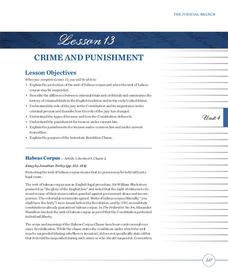Teaching Tolerance
The War on Drugs—Mechanisms and Effects
The war on drugs doesn't have definite results. An interesting lesson plan examines the social, political, and economic effect of the war on drugs. Academics learn how the war on drugs has led to mass incarcerations and negatively...
Smithsonian Institution
Separate is Not Equal: Fight for Desegregation
Separate is not equal! An eye-opening lesson delves into the past to understand the fight for desegregation and how it impacted African American communities. Academics complete two one-hour lessons using documents, photographs, and...
Newseum
The Freedom to Make a Change
As part of a study of the First Amendment, young historians research instances when individuals or groups used the First Amendment to change the United State's laws or policies. Teams are each assigned a different case study. With the...
National Woman's History Museum
Women, Education, Sports, and Title IX
Title IX did more than change the face of sports in the United States. This landmark legislation also impacted women in education and politics. High schoolers examine the text of the legislation and the 2016 Senate resolution and watch...
PBS
African American History: Climbing the Wall
Imagine the challenge of trying to trace your family genealogy if no records were kept of births and deaths. Where would you look for information? What types of documents could provide you with the information you seek? History...
Anti-Defamation League
Building Alliances
Bystander or up-stander? The final instructional activity in the "Looking Back Reaching Forward" unit asks participants to consider how they can become involved in encouraging change in their school and community.
Curated OER
The Kansas-Nebraska Act of 1854: Popular Sovereignty and the Political Polarization over Slavery
Why did Stephen Douglas support the Kansas-Nebraska Act of 1854? Why did Abraham Lincoln oppose it? Young historians examine how the Kansas-Nebraska Act of 1854 affected the political balance between free and slave states and explore how...
Heritage Foundation
Crime and Punishment
You wouldn't give someone a 10-day timeout for eating a piece of candy. The US government, too, does not believe in unreasonable punishment. A variety of exercises exploring the clauses of the US Constitution prompts class members to...
National Woman's History Museum
Dolores Huerta and the Delano Grape Strike
Few have heard of Dolores Huerta and her part in organizing the California farm workers, establishing the United Farm Workers union and orchestrating the Delano Grape strike. High schoolers consider why this powerful woman has been...
Curated OER
US Patriot Act: Security vs. Privacy
Students use readings, worksheets and discussion to explore the ramifications of the US Patriot Act which was passed by Congress shortly after September 11th. They review Constitutional Amendments and consider how they relate to the...
Curated OER
Apartheid and Segregation
Students view a television program that depicts the history South African Apartheid and the United States' system of segregation. They discuss how laws were used to uphold these institutions and compare and contrast racism and...
Curated OER
Fox hunting debate
Young scholars read the internet article "Hundreds of Hunts Out Despite Ban". The teacher then holds a class discussion about it. Students then hold a formal debate representing all points of view on the issues. Young scholars then...
Curated OER
Ruby Bridges: One Little Girl's Brave Act
Second graders examine the life of Ruby Bridges. In this bravery lesson, 2nd graders read the story of Ruby Bridges and discuss Ruby's actions and decisions.
Curated OER
Martin Luther King Jr. Who Is He?
Young scholars describe MLk's leadership of the desegregation movement. Students discuss the meaning of non-violent revolution. Young scholars identify the difference between their lives and those ofcitizens in 1963. Students write a...
Curated OER
Canadian Citizenship and National Identity
Students explore the dynamics of Canadian citizenship. They plan and produce a school wide celebration of citizenship.
Curated OER
Lesson Plan on Homeless Children
Students research reasons as to why children end up living on the streets. This instructional activity examines reasons as to what happens to parents and adult caregivers so that they are no longer able to provide basic needs for these...
Curated OER
Governance Grade 10
Students participate in talking circles regarding governance issues. In this self-governance lesson, students examine First Nations and land claims in the Great Slave Lake area in Canada.
Curated OER
Treaties- Grade 7
Seventh graders examine treaties pertaining to the Canadian natives. In this Canadian history lesson, 7th graders research and discuss the negotiations that took place between the First Nations cultures and the Canadian government over...
Curated OER
Treaties - Grade 10
Tenth graders examine the First Nations Treaty. In this Canadian history lesson, 10th graders participate in talking circles that require them to analyze "The Royal Proclamation."
Curated OER
Undercover in the Secret State
Young scholars examine the current conditions in North Korea. They view and analyze a CNN documentary, research a dissident, answer and discuss questions about the documentary on conditions in North Korea, and identify the technology...
Curated OER
Jury Duty: Honor or Burden
Students come up with a synopsis of whether they feel jury duty is necessary or not and how people rate their experience. They research state jury duty websites and express their ideas. They can propose changes that they feel may...
Curated OER
Freedom of Religion
Students use this lesson to focus on the freedom of religion. In groups, they discuss how the separation of church and state applies to the public schools across the country. They compare and contrast the establishment and free exercise...
Curated OER
No Choice!
Young scholars explore the concept of democratic freedom. In this service learning lesson, students investigate the freedom the Pilgrims sought as they moved from England and write a journal from their point of view.
Curated OER
Where are the Famous Women in History?
Students investigate sexism in history by identifying important women from the U.S. In this women's equality activity, students discuss why they remember more men in the history of the U.S. than women. Students compare women's and...

























